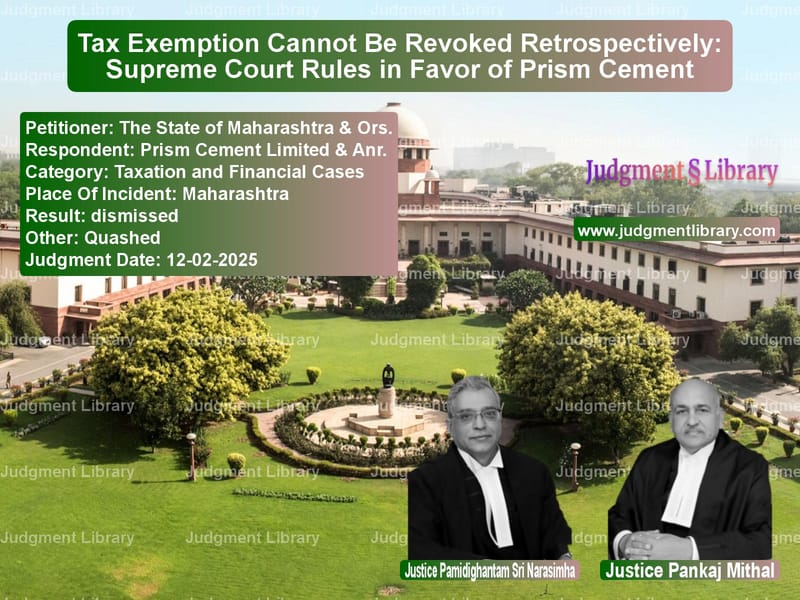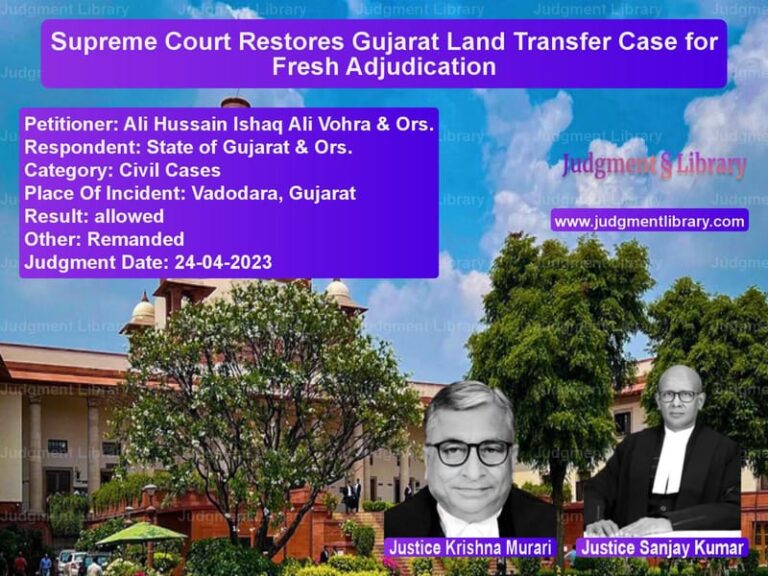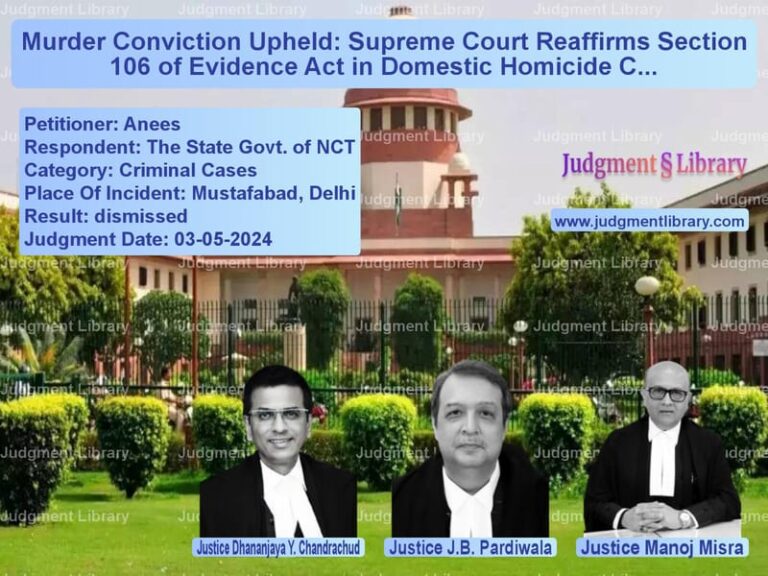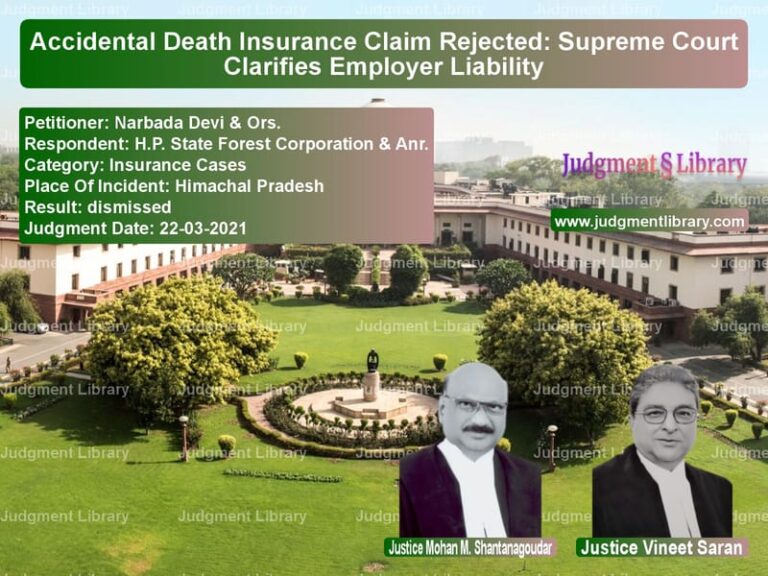Tax Exemption Cannot Be Revoked Retrospectively: Supreme Court Rules in Favor of Prism Cement
The Supreme Court of India recently ruled in the case of The State of Maharashtra & Ors. vs. Prism Cement Limited & Anr., addressing the legality of withdrawing tax exemptions granted under the Package Scheme of Incentives (PSI) 1993. The ruling clarifies the implications of the amendment to Section 8(5) of the Central Sales Tax Act (CST Act) and whether it can be applied retrospectively to withdraw benefits already granted to an entity.
The case involved a dispute over the Maharashtra government’s attempt to revise the tax assessment of Prism Cement Limited by demanding payment of tax that had been exempted under the PSI 1993. The government justified this demand based on amendments made to Section 8(5) of the CST Act in 2002, which imposed new conditions on tax exemptions.
The Supreme Court dismissed the appeals filed by the Maharashtra government, ruling that tax exemptions granted under an existing scheme could not be revoked retrospectively. The decision reaffirmed that businesses are entitled to rely on government incentives and that amendments in tax laws cannot unfairly disrupt vested rights.
Read also: https://judgmentlibrary.com/taxation-on-lottery-distributors-supreme-court-ruling-explained/
Background of the Case
The case arose when the Maharashtra government attempted to revise the tax exemptions granted to Prism Cement Limited. The company, a public limited entity, had been eligible for benefits under the Package Scheme of Incentives (PSI) 1993, which aimed to promote industrial growth in backward areas by providing tax relief.
Key facts of the case:
- The Maharashtra government introduced PSI 1993 to encourage industrial units to establish themselves in backward areas by offering tax incentives.
- Prism Cement Limited was issued an Eligibility Certificate (20.02.1998) and an Entitlement Certificate (24.03.1998) granting tax exemption under the scheme.
- The exemption was valid until 2012 or up to ₹273.54 crores, whichever was earlier.
- Following an amendment to Section 8(5) of the CST Act in 2002, the Maharashtra government issued trade circulars in 2002 and 2007, withdrawing the tax exemption unless businesses furnished Form ‘C’ or ‘D’ declarations.
- Notices were issued to Prism Cement in February 2009, demanding payment of previously exempted taxes.
- The company challenged these notices in the Bombay High Court, which ruled in its favor, leading the state to appeal to the Supreme Court.
Legal Issues Considered
The Supreme Court had to decide:
- Whether the Maharashtra government could retrospectively revoke tax exemptions granted under PSI 1993.
- Whether the amendment to Section 8(5) of the CST Act in 2002 affected benefits already granted before the amendment.
- Whether businesses were required to submit Form ‘C’ or ‘D’ to continue receiving tax exemptions.
- Whether the trade circulars issued by the Maharashtra government were legally valid.
Arguments of the Appellant (State of Maharashtra)
The Maharashtra government argued:
- The amendment to Section 8(5) of the CST Act in 2002 imposed new conditions, making it mandatory for businesses to submit Form ‘C’ or ‘D’ to avail tax exemptions.
- Since Prism Cement had not complied with these new requirements, the government had the authority to demand payment of exempted taxes.
- The power to grant tax exemptions was subject to legislative changes, and businesses could not claim an absolute right to tax relief.
- The trade circulars issued in 2002 and 2007 were legally valid as they were consistent with the amended law.
Arguments of the Respondent (Prism Cement Limited)
The company countered:
- The tax exemption granted under PSI 1993 was absolute and not conditional on Form ‘C’ or ‘D’ submissions.
- The Maharashtra government’s trade circulars and subsequent tax demands were an attempt to apply the law retrospectively.
- Once the Eligibility and Entitlement Certificates were issued, the government had no authority to revoke them unilaterally.
- The Finance Act, 2002, did not expressly state that its provisions applied retrospectively.
- The demand notices violated principles of legitimate expectation and non-arbitrariness.
Supreme Court’s Observations
The Supreme Court examined the nature of tax exemptions, the impact of legislative amendments, and the rights of businesses that had already been granted benefits.
On the Retrospective Application of the Amendment
“A statute is presumed to be prospective unless it is expressly or by necessary implication made to have retrospective operation. The Finance Act, 2002, does not indicate any legislative intent to apply retrospectively.”
Read also: https://judgmentlibrary.com/supreme-court-overrules-excise-duty-demand-against-bharat-petroleum/
On the Rights of Businesses Under PSI 1993
“Prism Cement Limited was granted tax exemption through validly issued Eligibility and Entitlement Certificates. The state government cannot unilaterally alter or withdraw these benefits without due process.”
On the Requirement of Form ‘C’ or ‘D’
“The amended Section 8(5) does not apply retrospectively. Therefore, the government’s insistence on Form ‘C’ or ‘D’ for past transactions is unlawful.”
Final Judgment
The Supreme Court upheld the Bombay High Court’s decision and ruled:
- The tax exemptions granted to Prism Cement Limited under PSI 1993 remained valid until the expiry of the benefit period.
- The amendment to Section 8(5) of the CST Act in 2002 could not be applied retrospectively to revoke exemptions already granted.
- The demand notices and trade circulars issued by the Maharashtra government were quashed.
- The state government was not entitled to recover the previously exempted taxes.
Conclusion
This landmark ruling reaffirms key legal principles:
- Tax exemptions granted under a government scheme cannot be revoked arbitrarily or retrospectively.
- Legislative amendments must explicitly state if they apply retroactively.
- Businesses are entitled to rely on government incentives and plan their financial decisions accordingly.
By ruling in favor of Prism Cement Limited, the Supreme Court has provided clarity on the scope of tax exemptions and ensured that businesses are protected from unpredictable and retrospective taxation policies. The judgment serves as a precedent for cases where state governments seek to withdraw benefits granted under long-term incentive schemes.
Petitioner Name: The State of Maharashtra & Ors..Respondent Name: Prism Cement Limited & Anr..Judgment By: Justice Pamidighantam Sri Narasimha, Justice Pankaj Mithal.Place Of Incident: Maharashtra.Judgment Date: 12-02-2025.
Don’t miss out on the full details! Download the complete judgment in PDF format below and gain valuable insights instantly!
Download Judgment: the-state-of-maharas-vs-prism-cement-limited-supreme-court-of-india-judgment-dated-12-02-2025.pdf
Directly Download Judgment: Directly download this Judgment
See all petitions in Income Tax Disputes
See all petitions in Tax Refund Disputes
See all petitions in Banking Regulations
See all petitions in Judgment by P.S. Narasimha
See all petitions in Judgment by Pankaj Mithal
See all petitions in dismissed
See all petitions in Quashed
See all petitions in supreme court of India judgments February 2025
See all petitions in 2025 judgments
See all posts in Taxation and Financial Cases Category
See all allowed petitions in Taxation and Financial Cases Category
See all Dismissed petitions in Taxation and Financial Cases Category
See all partially allowed petitions in Taxation and Financial Cases Category







